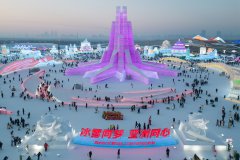Home>>
Old commercial street in Beijing evolves into trendy consumption hub, showing potential of 'first-store economy'By Ma Tong (Global Times) 10:59, March 03, 2025
On a recent weekday, THE BOX Youth Energy Center in Beijing's Chaowai street was bustling with crowds - mostly young people hanging out, many of whom brought their pets along to play.
Huo Wenting, a 24-year-old resident, has become a regular at the center known for "first stores" of iconic brands. "About 70 percent of the stores here are first stores of trendy brands you can't find elsewhere, like niche perfume shops, Hanfu [traditional Chinese clothes] fashion stores, and metaverse-themed coffee shops," Huo told the Global Times.
Chaowai street was once one of the oldest and biggest commercial streets in the Chinese capital, known for its electronics stores. Over the years, amid rapid urban development and the e-commerce boom, Chaowai street faced various challenges, including aging building infrastructure and a gradual decline in competitiveness.
However, thanks to an innovative project, after undergoing a series of upgrades in space, experience, and lifestyle, the storied commercial street has evolved into a new retail art experience space and has become a new consumption landmark in Beijing. On the national level, it exemplifies a nationwide campaign to boost retail consumption through innovation.
Within the first year of trial operations from September 2023 to October 2024, the center attracted nearly 15 million visitors, with nearly 80 percent of its members aged 15 to 25. It has drawn nearly 100 Chinese trendy brands, 85 percent of which are their first stores in Beijing, with total sales hitting 500 million yuan ($69 million) in one year, per a white paper co-released by the center at the end of October 2024.
In January, MINISO announced its exclusive role as the global offline retailer for the official merchandise of the video game Black Myth: Wukong. The Beijing MINISO LAND at THE BOX Youth Energy Center was among the first five stores in China to launch the peripherals, store manager Wang Cheng told the Global Times, noting "a high demand on the opening day."
Wang said that the store's exclusive offline launch, along with purchase-with-gift deals and limited-edition offers, also drew a large crowd of loyal fans from nearby provinces such as North China's Hebei and East China's Shandong.
In addition, driven by the recent success of the Chinese animated movie Ne Zha 2, its merchandise, like collectible cards and blind boxes, has seen a sales surge, with many items selling out within just 2 to 3 days of hitting shelves, according to Wang.
THE BOX Youth Energy Center draws not just youngsters like Huo but also the elderly.
Fu Lili, a resident in her 50s, has lived in the neighborhood for over 20 years, and she now visits THE BOX Youth Energy Center almost every week. "The arrival of new brands and young consumers has turned the once-quiet old street into a vibrant hotspot," Fu told the Global Times.
Fu pointed out that the center's pet-friendly vibe, trendy brands, and constantly refreshed products have even sparked a shopping itch among senior consumers like her. She dubs it a "cross-age connection" between the post-2000 crowd and the silver-haired crew.
The center has become a prime example of several new consumption trends in the Chinese market, including "first-store economy," "debut economy", and the "silver economy."
In the "first-store economy," a "first store" refers to the debut outlet of an iconic brand in its industry or a trendy new label in a specific area, including global, national, regional, or industry-first locations, or a new concept store from an established brand. This ties into the wider concept of the "debut economy," which encompasses companies launching new products and introducing innovative business models, services, and technologies, as well as establishing flagship stores.
Vast potential
Highlighting the vast potential of such trends, China's policymakers have called for actively promoting the "debut economy" in a resolution adopted at the third plenary session of the 20th Communist Party of China Central Committee. The Central Economic Work Conference held in December also urged active efforts to develop the "debut economy" as part of this year's key tasks to expand domestic consumption.
Among the latest policy initiatives, on February 17, five Chinese government departments unveiled a three-year action plan, urging local governments to capitalize on regional advantages to foster the "debut economy" and develop consumption landmarks, thereby creating new spending opportunities.
The rise of the "first-store economy" is creating a ripple effect, Hu Qimu, deputy secretary-general of the Digital-Real Economies Integration Forum 50, told the Global Times, noting "by revitalizing traditional shopping areas, it will help expand domestic demand and drive consumption upgrades, which are in line with the government's goal to boost consumption."








